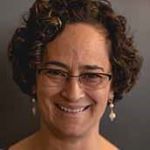Addressing Gender Inequity in Israel Studies
Dec. 9, 2019
By Gila Silverman and Rachel Harris
Editor's note: This blog post discusses one of the Association for Jewish Studies (AJS) presentation. As part of a roundtable discussion exploring the status of women in Jewish Studies and Israel Studies, Drs. Gila Silverman and Rachel Harris will be presenting their research, which was supported by an HBI Research Award, on the ways that gender impacts career trajectories in Israel Studies.
 In Israel studies, there are only four tenured women faculty in North America, and no female full professors in the United States or Canada. Of the 36 Israel Studies centers in North America listed on the Association for Israel Studies (AIS) website, only one is run by a woman. In Israel, there are 40 programs or centers that work in Israel Studies, and only three are directed by women.
In Israel studies, there are only four tenured women faculty in North America, and no female full professors in the United States or Canada. Of the 36 Israel Studies centers in North America listed on the Association for Israel Studies (AIS) website, only one is run by a woman. In Israel, there are 40 programs or centers that work in Israel Studies, and only three are directed by women.
The absence of women in senior positions in the field is especially concerning, given that growing numbers of women are working in Israel Studies, and excelling in research, publication and teaching. For example, women have received 13 out of 22 annual Ben Halpern Award for Best Dissertation in Israel Studies; and authored, or co-authored, eight out of the 23 books awarded the Shapiro Prize for the Best Book in Israel Studies.
The relative gender equity at the graduate level slowly disappears during the transition from degree to employment, and particularly as one progresses through the ranks of tenure-stream faculty. Anecdotal evidence shows that few women completing a PhD in Israel Studies progress beyond postdoctoral fellowships or contingent academic positions, despite the relatively large percentage of new faculty positions in Israel Studies (compared to other fields, including Jewish Studies). Women are more likely to find employment in lower status non-tenure track administrative appointments, contingent labor positions or in alternative-academic careers.
The Task Force on Women in Israel Studies was convened by Dr. Rachel Harris o identify the causes of this "leaky pipeline" and to remedy it. The task force seeks to gather information on the situation of women in Israel Studies; to facilitate networking and mentoring among women in the field; and to propose policy and programmatic solutions to the systemic issues that affect women's advancement.
The first meeting of the task force took place March 10-12, 2019, at the University of Illinois, Urbana Champaign. It brought together 23 women working in Israel studies, from the United States, Canada, Germany and Israel; they included associate professors, assistant professors, post-doctoral fellows, graduate students, administrators in academic non-profits and unsalaried independent scholars.
The task force meeting also provided a forum in which we could gather qualitative data on factors affecting career trajectories in Israel Studies. Focus groups with the women present allowed us to explore the benefits to Israel Studies of increasing women’s involvement in the field; what helps to build careers; networking and mentoring; obstacles to career development; potential solutions to barriers identified; and impact of family responsibilities and parenting on careers.
Through preliminary analysis of these focus groups, as well as ethnographic observations conducted throughout the three-day meeting and at the annual meeting of the Association for Israel Studies, we have begun to identify an interwoven set of issues influencing the career trajectories of women in Israel studies. Some are similar to those facing women throughout academia, while some are specific to this field.
Issues that face women throughout academia include decreasing resources, limited job opportunities, both explicit and implicit discrimination linked to gender norms and sexual harassment. Other issues are specific to Israel studies, including, for example, the politics and ideologies (real and perceived) relating to working on Israel/Palestine; the discipline's historic emergence out of particular male-dominated intellectual and social networks; a lack of female role models and mentors; and the undervaluing of the methods, topics and populations that women are more likely to study.
One of the central themes that emerged in these conversations was that both Israeli society and American Jewish culture (in both of which Israel studies is primarily embedded) are inherently patriarchal. Much of this may manifest in ways that are not obvious to the men involved, but of which the women are acutely aware. Women report body language, informal comments, and informal social interactions that make them feel that they do not belong and are not taken seriously as scholars; they often feel that they are seen first as women, daughters, granddaughters and mothers rather than as intellectual peers. A related issue was the gendered social norms that influence the division of family responsibilities (both for child and elder care); perhaps the single greatest topic of informal conversation at the meetings was the often overwhelming "mental load" carried by women, as they manage their families and careers.
Addressing the complex web of issues influencing gender parity in Israel Studies will require a multi-layered and multi-directional process, involving raising awareness and training; creating opportunities for networking, mentoring, and support among women in the field; and structural and systemic changes. These disparities, developed over years, will likely take years to remove. Doing so demands greater awareness, deep honesty, and a willingness to be uncomfortable. In particular, issues such as prestige, value, hierarchy, social and family norms, comfort, and mental load cannot be resolved only through policy changes.
Much more research — both within AIS and to learn from other professional associations who are addressing the same issues, including AJS — is needed to determine which solutions are most feasible and will have the most impact. It is also essential to gather additional data to understand these factors more deeply, establish their prevalence beyond this small group of women, and compare experiences and trajectories across genders and countries.
The roundtable discussion on Women in the Profession will take place at 3:30-5 p.m. Dec. 16 at the Association for Jewish Studies annual meeting in San Diego. In addition to Rachel Harris and Gila Silverman, the panel with include Jennifer Thompson, Sarah Imhoff, Susannah Heschel, Matthew Boxer and Gayle Zachmann.
 Gila Silverman is a 2017 HBI Scholar-in-Residence and a visiting scholar at the Arizona Center for Judaic Studies.
Gila Silverman is a 2017 HBI Scholar-in-Residence and a visiting scholar at the Arizona Center for Judaic Studies.
Rachel S. Harris is Associate Professor of Israeli Literature and Culture in Comparative and World Literature and the Program in Jewish Culture and Society at the University of Illinois, Urbana-Champaign.